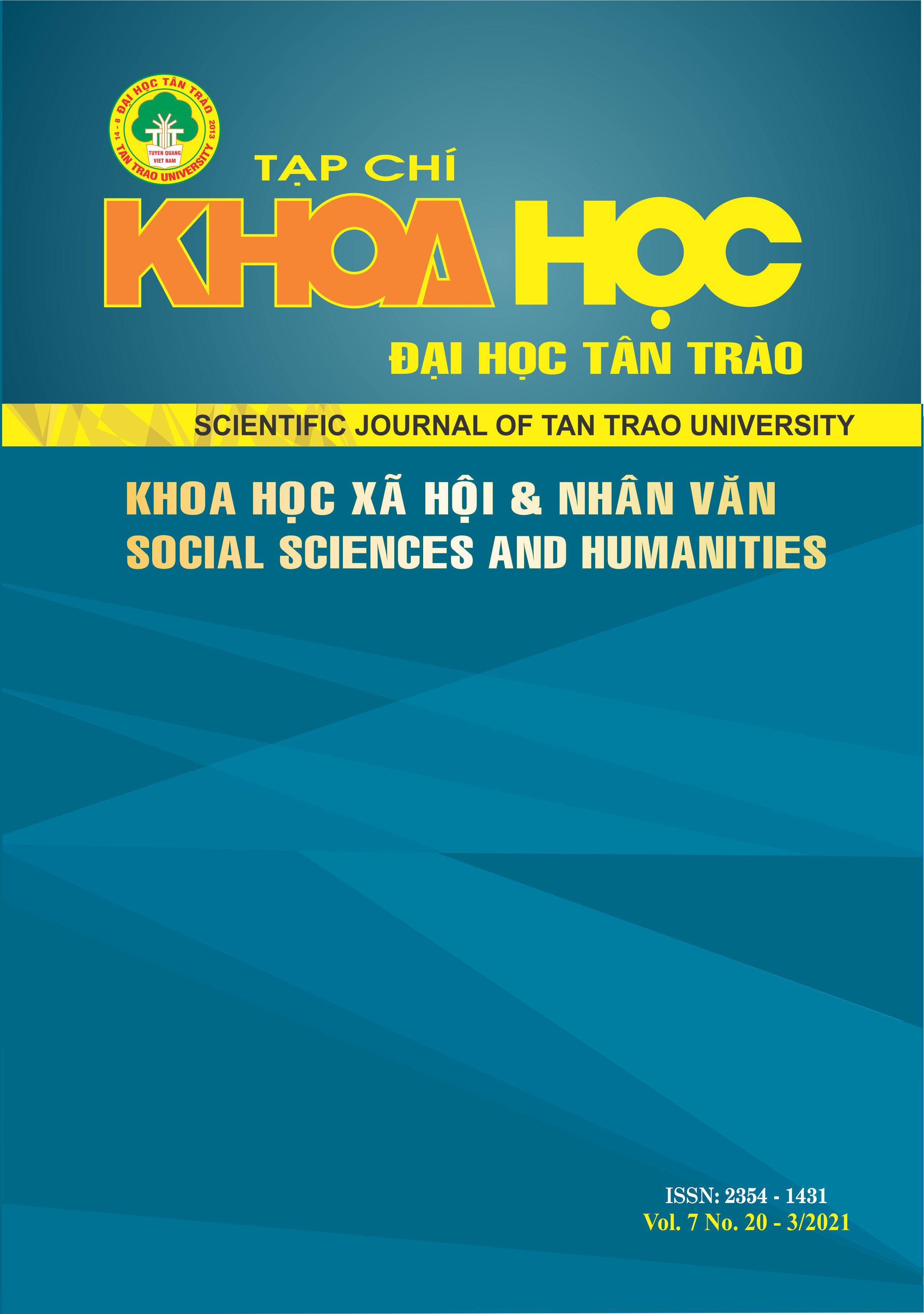SỰ TÁC ĐỘNG CỦA MÔI TRƯỜNG HỌC LÊN ĐỘNG CƠ HỌC TẬP ẢNH HƯỞNG BỞI NĂNG LỰC HỌC CỦA SINH VIÊN TRƯỜNG ĐẠI HỌC LUẬT HÀ NỘI
DOI:
https://doi.org/10.51453/2354-1431/2021/488Từ khóa:
Môi trÆ°á»ng há»c, Ä‘á»™ng cÆ¡ há»c táºp, năng lá»±c há»c, quá trình há»cTóm tắt
Chiến lược học và nỗ lực học tập tốt được coi như là động lực học để thúc đẩy sinh viên có kết quả học tập tốt. Nghiên cứu này xem xét sự tác động trực tiếp và gián tiếp của môi trường học đối với động cơ học tập của sinh viên đại học. 119 sinh viên đại học của trường Đại học Luật Hà Nội được lựa chọn làm mẫu nghiên cứu trả lời phiếu điều tra. Kết quả chỉ ra rằng không khí lớp học có tác động tích cực đến động cơ học tập của sinh viên và mối liên hệ này có sự ảnh hưởng của năng lực học của sinh viên. Đặc biệt kết quả cũng chỉ ra rằng một môi trường học tốt có thể cải thiện đến động lực học và một không khí lớp học công bằng sẽ cải thiện tốt năng lực học của sinh viên. Nghiên cứu này làm sáng tỏ vai trò thiết yếu của môi trường học tác động đến việc học của sinh viên. Hơn nữa nghiên cứu này là nguồn tham khảo hữu ích cho nhà lập chính sách, quản trị trường học và giảng viên trong việc xây dựng môi trường học tích cực.
Tải xuống
Tài liệu tham khảo
[1] Cleary, T. J., Kitsantas, A. (2017). Motivation and self-regulated learning influences on middle school mathematics achievement. School Psychology Review, 46(1), 88-107. doi:10.17105/spr46-1.88-107
[2] Froiland, J. M., Worrell, F. C. (2016). Intrinsic motivation, learning goals, engagement, and achievement in a diverse high school. Psychology in the Schools, 53(3), 321-336. doi:10.1002/pits.21901
[3] Ladd, H. F., Sorensen, L. C. (2017). Returns to teacher experience: Student achievement and motivation in middle school. Education Finance and Policy, 12(2), 241-279. doi:10.1162/edfp_a_00194
[4] Supervia, P. U., Bordas, C. S. (2018). School Motivation, Emotional Intelligence and Academic Performance in Students of Secondary Education. Actualidades En Psicologia, 32(125), 95-112.
[5] Gao, X. L., Gao, L., (2015). The characteristics and grade differences in learning motivation, learning strategies, learning investment among undergraduate students. China Journal of Health Psychology, 23 (2), 274-277.
[6] Lerdpornkulrat, T., Koul, R., Poondej, C. (2018). Relationship between perceptions of classroom climate and institutional goal structures and student motivation, engagement and intention to persist in college. Journal of Further and Higher Education, 42(1), 102-115. doi:10.1080/0309877x.2016.1206855
[7] Stolk, J.D., Jacobs, J., Girard, C., Pudvan, L. (2018). Learners’ Needs Satisfaction, Classroom Climate, and Situational Motivations: Evaluating Self-Determination Theory in an Engineering Context. 2018 IEEE Frontiers in Education Conference (FIE), 1-5. doi:10.1109/fie.2018.8658880
[8] Taheri-Kharameh, Z., Sharififard, F., Asayesh, H., Sepahvandi, M., Hoseini, M. H. (2018). Relationship between Academic Self-efficacy and Motivation among Medical Science Students. Journal of Clinical and Diagnostic Research, 12(7), 7-10. doi: 10.7860/JCDR/2018/29482.11770
[9] Verešová, M., Foglová, L. (2016). Academic self–Efficacy, heteronomous and autonomous evaluation of academic achievement of adolescents. Paper presented at the 7th International Conference on Education and Educational Psychology (ICEEPSY 2016). URL: http://dx.doi.org/10.15405/epsbs.2016.11.91
[10] Cave, P. N., Evans, N. W., Dewey, D. P., Hartshorn, K. J. (2018). Motivational partnerships: increasing ESL student self-efficacy. Elt Journal, 72(1), 83-96. doi:10.1093/elt/ccx027
[11] Huang, C., Bai, Q.-h. (2017). The Relationship Between Classroom Climate, Self-Efficacy, and Learning Motivation. DEStech Transactions on Social Science, Education and Human Science, 308-312. doi:10.12783/dtssehs/ermm2017/14731
[12] Hair Jr, J. F., Hult, G. T. M., Ringle, C., Sarstedt, M. (2017). A primer on partial least squares structural equation modeling (PLS-SEM) (Second ed.). Los Angeles: Sage publications.
Tải xuống
Đã Xuất bản
Cách trích dẫn
Số
Chuyên mục
Giấy phép

Tác phẩm này được cấp phép theo Giấy phép Quốc tế Creative Commons Attribution-ShareAlike 4.0 .
Bài báo được xuất bản ở Tạp chí Khoa học Đại học Tân Trào được cấp phép theo giấy phép Ghi công - Chia sẻ tương tự 4.0 Quốc tế (CC BY-SA). Theo đó, các tác giả khác có thể sao chép, chuyển đổi hay phân phối lại các bài báo này với mục đích hợp pháp trên mọi phương tiện, với điều kiện họ trích dẫn tác giả, Tạp chí Khoa học Đại học Tân Trào và đường link đến bản quyền; nêu rõ các thay đổi đã thực hiện và các nghiên cứu đăng lại được tiến hành theo cùng một bản quyền.
Bản quyền bài báo thuộc về các tác giả, không hạn chế số lượng. Tạp chí Khoa học Tân Trào được cấp giấy phép không độc quyền để xuất bản bài báo với tư cách nhà xuất bản nguồn, kèm theo quyền thương mại để in các bài báo cung cấp cho các thư viện và cá nhân.
Mặc dù các điều khoản của giấy phép CC BY-SA không dành cho các tác giả (với tư cách là người giữ bản quyền của bài báo, họ không bị hạn chế về quyền hạn), khi gửi bài tới Tạp chí Khoa học Đại học Tân Trào, tác giả cần đáp ứng quyền của độc giả, và cần cấp quyền cho bên thứ 3 sử dụng bài báo của họ trong phạm vi của giấy phép.






